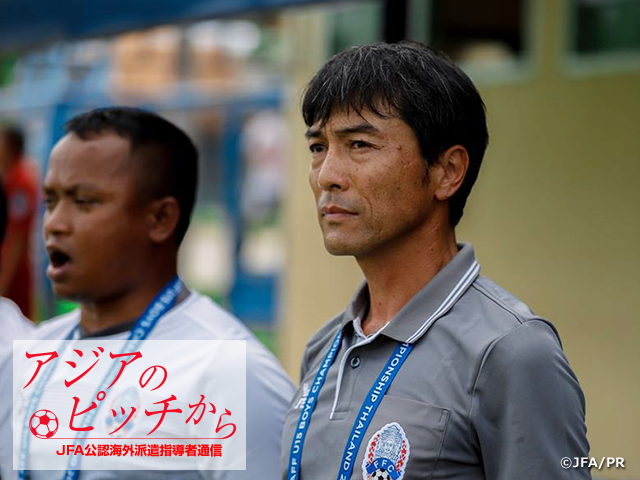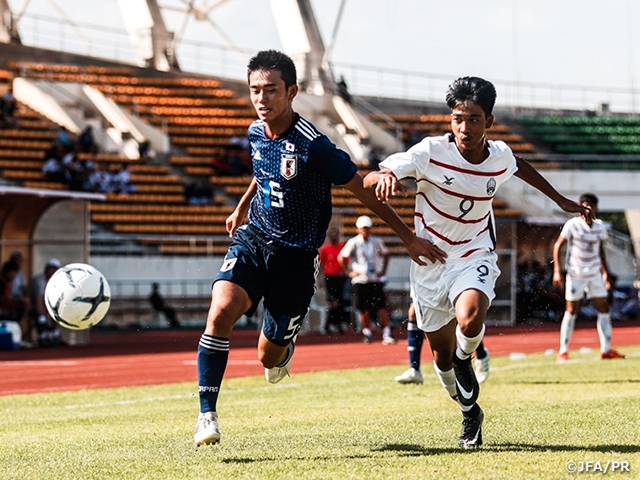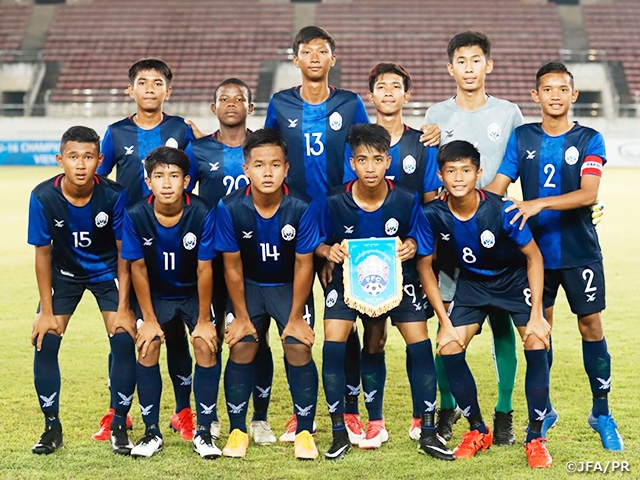NEWS
From Pitches in Asia – Report from JFA Coaches/Instructors in Asia Vol.38: INOUE Kazunori, Coach of U-15 Cambodia National Team/Football Academy
29 November 2019

Impression of Cambodia
Starting from February 2019, I was appointed as the coach of U-15 Cambodia National Team and the Football Federation of Cambodia (FFC) Academy. While we coach the players at the academy on a day to day basis, we form the national team ahead of each international tournament. I was involved in player development in Cambodia from February 2016 to January 2018, so it has been a year since my last tenure in Cambodia.
Although I was away from Cambodia for just one year, I am seeing more high-rise buildings and roads that are now well maintained. With more people owning a vehicle, it feels like there is more traffic. Compared to my first visit to Cambodia, driving manners have improved and Cambodia is showing great development in both economy and educational standards.
Cambodia Football Academy; Relationship between Cambodian Football and Japan
The National Training Centre is located in Tonle Bati (commonly known as Bati), a town in Takeo Province, an hour and a half drive from Phnom Penh, the capital city of Cambodia. The facility consists of three natural turf fields, one artificial turf field (with lights), and buildings for accommodation and training purposes. Both U-18 and U-15 players live in dormitories, where they are provided with an environment where they can solely focus on football.
Established in 2014, the Cambodia Football Academy was developed mainly by Japanese coaches. From 2017, Korean coaches looked over the U-17 and U-15 categories but starting from 2019, those two categories are now coached by Japanese coaches as well.
Besides the academy that we are currently coaching at, there are also provincial academies that were established in 2017, in each of the 25 provinces in Cambodia. The development of these provincial academies has made a dramatic impact on how players are scouted in Cambodia.
With Mr. KARAKIDA Tetsu serving as the Referee Director, Mr. OHARA Kazunori as the Technical Director, and Mr. GYOTOKU Koji as the coach of U-18 Cambodia National Team and the academy, there are currently four JFA instructors despatched to the FFC including myself. Also, with Mr. HONDA Keisuke serving as the head coach of the Cambodia Senior National Team, you can tell how much belief the Cambodian football community has towards Japanese football.
Most players from the first graduating class of the academy were developed by Japanese coaches, and are now playing for teams at the first division of the Cambodian League. Some players are already included into the senior national team, competing at the World Cup qualifiers.

Activities of the Academy and National Team
The lack of tournaments for youth category has been a major issue in Cambodia. Although the U-18 academy team was able to gain valuable match experiences by joining the top division of the Cambodian League, the U-15 academy team was not able to gain sufficient experiences at a regular basis, especially after seeing several of their tournament being postponed for various reasons. A typical household in Cambodia has little to spare on football, thus in most cases, the tournament host must bear the entire running cost of the tournament. Because of the high cost for the host, there are very few tournaments held in Cambodia. That is why we must develop low cost tournaments and spread grassroots activities throughout the country.
While most players were selected from the academy, we also invited players from other clubs to build the U-15 Cambodia National Team. This season, we started with the team in late April, held try-outs for the team in mid-June, and played international friendly matches and international tournaments from July to mid-October. Therefore, despite seeing limited opportunities to play domestically, the players were able to maintain their motivations throughout the season. The team also had the opportunity to face the U-15 Japan National Team at the AFC U-16 Championship 2020 qualifications held in Laos during September.
Learning experience gained from the match against U-15 Japan National Team
Japan is an admiration for many kids in Asia, and fortunately, we were given the opportunity to challenge Japan at AFC U-16 Championship 2020 qualifications. The players and coaching staffs were eager to pull off an upset against Japan and prepared in the best way possible ahead of the match but ended up losing 0-8. The difference between the two teams seemed much greater than what the score suggested.
In order to prepare ourselves for this match, we played training matches against the China PR National Team, Australia National Team, Malaysia National Team, Thailand National Team, and a Belgian club, Standard Liege.
The players of the Japan National Team showcased their superiority in techniques and tactics, quick transitions between offence and defence, strong physical contact, and the athleticism to repeat these plays at a high level. On top of that, they maintained their concentration despite taking a commanding lead over us. Japan was one of the most difficult teams to play against.
The difference we saw in this match is not something we can close down in a few months, even if we give our utmost efforts. The Japanese players are inspired and encouraged by many coaches from a young age and the coaching torch is handed over to one coach to anther until they reach 15. Their current performance is only made possible through the continuous efforts made by both the coaches and players, and their development process will continue on to the later stages. Not only did we lose the match against the U-15 Japan National Team, we were shown just how efficient the Japanese football community is in developing football players at a young age.
While we saw Japan’s direction of player development and the significance of their organisational capability, we also felt the need for Japan to continue their evolution to lead the way for the Asian countries and become a team that can compete against the world as one of the representatives of Asia.

Future development of Cambodian football and the roles of Japanese coaches in Asia
Despite facing variety of obstacles, Cambodian football is making forward progress under the influence of Japan. However, we must strive for further improvements. In order to reach higher levels, we must improve the players’ techniques from a younger age, strengthen physical fitness according to the players’ developmental stage, and to discover and develop goalkeepers with physical abilities. These goals may not be achieved without good coaching on the field, organisational improvements of the team, and reformed tournament structures. If we can manage to improve on these aspects, it should help raise the overall level of Cambodian football.
In 2018 and 2019, we sent three players and one coach from our academy to a three week training course held by Vegalta Sendai. While the players were deeply inspired, the coach was greatly influenced by this course. After experiencing the work of a Japanese coach: making visits to kindergartens and primary schools while holding football schools, and working at the academy, etc., the Cambodia coach was surprised by the workload and efforts made towards youth development. In order to improve the level of coaches in Cambodia, it is very important to have Cambodian coaches learn in first-hand how coaches in other countries are working to develop their young talents.
In Asian football, we are seeing more and more coaches arriving from Europe, and Japanese coaches are often times compared against them. While European coaches are used to coaching teams under a mature football culture, the Japanese coaches have experienced the rapid development of Japanese football following the formation of the J.League. In that sense, Japanese coaches might be more suited for jobs to raise the level of football in such developing countries.
Japanese coaches are always conscious about the educational aspect while coaching football. I was once told by a Cambodian staff that “We never have to ask Japanese coaches to look after the educational aspect of a player.” According to that person, it is a rare quality only seen from Japanese coaches. The idea of “Learning something from football” is an important principle, especially for a country with educational needs.
Through our experience at the AFC Youth Conference held in November, we learned that Japan has good reputation in Asian football, and that there are huge expectations for Japan. As time progresses, I believe that Japanese football will be responsible to take on a more significant role within the Asian football community.
Related Information
Related News
-
2019/09/30
From Pitches in Asia – Report from JFA Coaches/Instructors in Asia Vol.37: KAWAMOTO Naoko, Coach of U-16/U-19 Mongolia Women's National Team

-
2019/04/26
From Pitches in Asia – Report from JFA Coaches/Instructors in Asia Vol.36: TSUKITATE Norio, Coach of Timor-Leste National Team

-
2018/07/19
From Pitches in Asia – Report from JFA Coaches/Instructors in Asia Vol.34: HIRATA Reiji, Head of Youth Development of the Philippines Football Federation

-
2018/04/05
From Pitches in Asia – Report from JFA Coaches/Instructors in Asia Vol.33: OHARA Kazunori, Technical Director of Football Federation of Cambodia

Latest News
-
National Teams
2025/07/10
【Match Report】Yakata and Takikawa Score Debut Goals in Nadeshiko Japan’s 4-0 Victory Over Chinese Taipei

-
National Teams
2025/07/09
【Match Report】SAMURAI BLUE Thrash Hong Kong, China 6-1 with Germain Scoring Four Goals on His Debut

-
National Teams
2025/07/03
SAMURAI BLUE (Japan National Team) squad & schedule - EAFF E-1 Football Championship 2025 Final Korea Republic

-
National Teams
2025/06/28
【Match Report】Nadeshiko Japan Fall 1–3 to Spain

-
National Teams
2025/06/24
U-16 Japan National Team squad & schedule - China PR Tour: CFA PEACE CUP (7/1-9@Shenyang, China PR)



